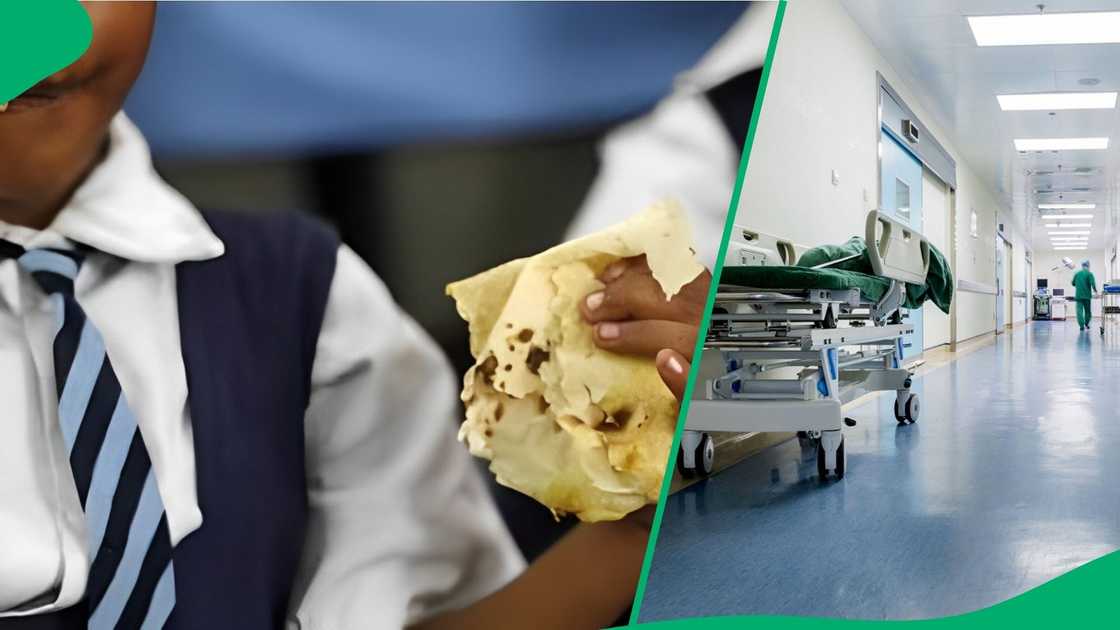Gauteng Faces Surge In Food Poisoning Cases, Claiming Lives Of Children
- Over 200 food poisoning cases have tragically claimed the lives of 10 children aged three to 10 in Gauteng.
- Five districts, including Ekurhuleni, Johannesburg, and Tshwane, have recorded these cases, according to the Gauteng Health Department.
- Gauteng health spokesperson Motalatale Modiba confirmed to Briefly News that there has been a significant rise in cases over the past two years.

JOHANNESBURG — The Gauteng province is grappling with a surge in food poisoning cases, resulting in the tragic deaths of ten children since February 2024. This alarming trend has sent shockwaves through communities, drawing attention to the urgent need for improved food safety measures and awareness.
In the span of just nine months, a staggering 207 cases have been reported, with incidents concentrated in townships, informal settlements, and hostel communities. These areas, where families often rely on affordable snacks and prepared meals, have become hotspots for foodborne illnesses.
Tragic Loss of Young Lives in Gauteng
The situation has taken a devastating turn, with the most recent victims being two young siblings aged four and six. On Thursday, August 29, the children were admitted to Gauteng hospitals after falling ill. They were treated at the Dr. George Mukhari Academic Hospital in Tshwane and the Jabulani Dumane Community Health Centre in Ekurhuleni but ultimately succumbed to their illness.
Read also:When Work Meets Comedy The Day A Zoom Mishap Became Viral
According to the Gauteng Health Department, the children reportedly consumed pap and soup at home before falling ill. In a separate incident, three children from Vosloorus also exhibited similar symptoms, including severe vomiting and weakness. Two of these children, aged three and five, tragically died upon arrival at the Jabulani Dumane Community Health Centre.
Health spokesperson Motalatale Modiba shared that a six-year-old boy related to one of the deceased children was taken to the Thelle Mogoerane Regional Hospital for critical care. "The child remains in a critical condition," Modiba said. "Our investigation revealed that a 28-year-old man, the uncle of the children, shared potato chips with them. He later showed symptoms of food poisoning but was treated and discharged after observation."
Modiba further revealed that since February 2024, 207 cases of food poisoning in children have been reported, resulting in ten deaths across Gauteng's five districts:
- Ekurhuleni — 119 cases, four deaths;
- Johannesburg — 40 cases, no deaths;
- Tshwane — 31 cases, three deaths;
- West Rand — 14 cases, no deaths;
- Sedibeng — three cases, three deaths.
Speaking to Briefly News, Modiba emphasized that this was not the first outbreak of its kind in Gauteng, though the recent spike is particularly alarming.
Understanding the Root Causes of Food Poisoning
While acknowledging the recurring nature of foodborne outbreaks, Modiba noted that the number of cases has surged in the past two years, disproportionately affecting children aged three to ten. When asked about the primary causes of food poisoning and the foods posing the highest risks, he explained the complexity of the issue.
"Food poisoning occurs when contaminated food—whether by bacteria, viruses, or chemicals—enters the body. Factors such as poor hygiene practices, the consumption of expired or counterfeit food items, and the use of harmful pesticides like organophosphate or Rattex near food preparation areas significantly increase the risk of contamination," said Modiba.
He added that many of the recent cases were linked to snacks such as biscuits and potato chips. However, illegal dumping, which fosters environments conducive to pests and rodents, also plays a critical role in spreading contamination.
Read also:Nota Baloyis Legal Drama The Inside Story
"The growing problem of illegal dumping creates breeding grounds for pests, prompting people to resort to harmful pesticides. This cycle ultimately contributes to the food safety issues we're facing today," Modiba explained.
To mitigate these risks, health officials recommend washing fruits and vegetables thoroughly, maintaining clean cooking surfaces, separating raw and cooked foods, cooking food thoroughly, and using safe water and raw materials. Modiba emphasized the importance of these practices, saying:
"The department is deeply concerned about the rising number of deaths and is actively collaborating with stakeholders, including the Gauteng Education Department, to raise awareness in vulnerable communities. Through health education sessions targeting pupils and vendors, we aim to empower residents with the knowledge they need to protect themselves and their families."
A Student's Tragic Death in Roodepoort
In a related incident, Briefly News reported the death of a pupil from Onkgopotse Tiro Primary School in Tshepisong, Roodepoort. Gauteng education spokesperson Steve Mabona said that two third-grade boys complained of severe stomach cramps and were rushed to Tshepisong Clinic. Tragically, one of the boys succumbed to suspected food poisoning, underscoring the urgent need for vigilance in schools and communities alike.
As the province continues to grapple with this crisis, health officials urge all residents to remain vigilant and informed about food safety practices. The lives of countless children depend on it.


